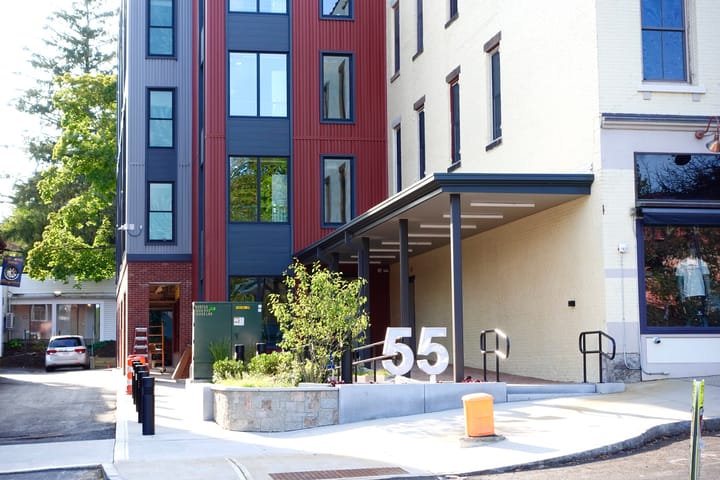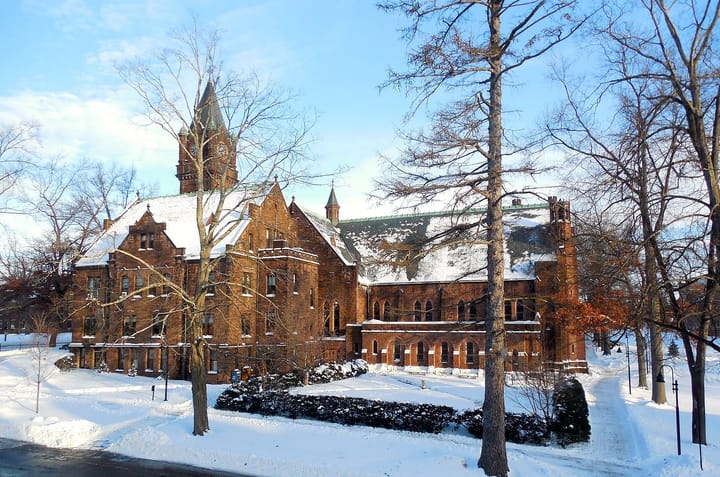Covid Policies Spur Uncertainty for Winter Athletes
Student athletes have experienced heightened uncertainty throughout the winter athletic season due to a host of Covid safety policies, which bar them from competition after they, or enough of their teammates, test positive.


Throughout the winter athletic season, increasing Covid cases on campus have prompted a host of Covid safety policies that bar athletes from competing once their team reaches a certain number of positive cases. Many winter athletes have expressed that the heightened uncertainty resulting from sudden cancellations of competitions has taken a toll on their mental health.
The policies in place prohibit intercollegiate competitions when “sustained increased transmission occurs on a team,” said Director of Sports Medicine Maria Rello. Rello also stated that the college follows advice given by the NCAA and supported by the NESCAC, which holds that “sustained increased transmission is likely occurring if teams with less than fifty members have concurrent positive cases of three or more, and if, teams with more than fifty members have concurrent positive cases of five percent or more.”
Additionally, athletes who test positive for Covid must follow a mandatory return-to-play progression before participating in practice and competition again. The progression includes a minimum rest period of three to 10 days depending on the severity of symptoms, followed by a minimum of a five-day return-to-play activity program consisting of incrementally strenuous workouts completed approximately 24 hours apart.
Winter athletes’ fears of cancellation were realized when, on multiple occasions, training trips and games were canceled only a few days, or even hours, prior to their scheduled times.
Sabrina Comess ’24, a member of the swim and dive team, described that the sudden cancellation of her team’s training trip in January due to rising Covid cases prompted her team to constantly worry about whether they would be able to continue training and competing throughout the season. “Especially at the beginning of January, when Omicron was really bad, every time we had a meet scheduled there was always [this question of] ‘Will it happen? Are we about to lose our whole season?’” she said.
Fellow swimmer Gabriele Filippo-Lunardi ’25 echoed Comess’ sentiments. “It’s been very difficult to stay focused and motivated when you have to prepare for the worst. Mentally, I feel like I’ve had to step back from the sport at times just so that I don’t get too disappointed if everything gets canceled,” he said.
Leading up to the NESCAC championships, many members of the team altered their social habits to decrease their chances of testing positive, said diver Hannah Colaizzo ’23. “A little over a week before NESCACs we limited our social circle to just the swim team. ... Some teammates even slept in different rooms if they were worried about their roommates potentially testing positive.”
“We knew that if someone tested positive within like a week and a half [of the competition], then that was it; they weren’t going to be able to compete and [achieve what] we had been working towards the whole year,” Comess said. “It’s one thing to get sick yourself — and that’s a bummer — but if you were to get your teammates sick and prevent [them] from having that chance, that’d be really awful.”
Colaizzo noted that, while it was difficult to cut down her social circle and free time to just the team, “it made it worth it to finally compete.”
Although the swim and dive team was ultimately able to participate in all of their scheduled meets, other teams had no such luck. Sidnie Kulik ’25, a member of the track and field team, reported that the administration had prohibited her team from attending the 2022 Boston University David Hemery Valentine Invitational held on Feb. 11-12.
Kulik expressed disappointment that the meet’s cancellation would interfere with the team’s future qualifications for competitions. “[That meet] is the most important competition of the regular season to be able to qualify for nationals … so it was difficult to have to be pulled out for Covid precautions,” she said.
In addition to feeling angst surrounding potential cancellations of competitions, those who tested positive for Covid reported even greater stress levels from their inability to practice and compete with their teammates.
Kulik said that her “mental health definitely took a hit with not being able to compete” after testing positive and missing two meets. “I missed the most competitive meet of the regular season, which has given me a lot of anxiety in terms of being able to hit a good time to qualify for postseason competition,” she said.
Yeshwin Sankuratri ’24, a member of the squash team, recalled that receiving a positive test the day before his team was scheduled to leave for the College Squash Association National Championships took a mental toll on him. Both Sankuratri and captain Charlie Sutherby ’23E received positive tests, taking two of the top players on the team out of the championship roster.
For Sutherby, this marks the third time in his college career where Covid stripped him of the opportunity to compete in the National Championships. Sutherby said that this tournament was supposed to be the “thing I’ve been waiting on for two years … the culmination of all that hard work.”
Even after accepting he would not have the opportunity to play in Nationals due to the return-to-play progression, Sutherby held out hope that he could be with the team after the mandatory quarantine period had ended. However, he learned on the morning of his sixth day of quarantine — the second day of Nationals — that he was still Covid-positive, ending his hopes of experiencing the last National Championships of his college career with the rest of his team.
“Initially, my only thoughts were about the team and the hope that I had not exposed anyone else to Covid-19,” Sankuratri said about learning that he had tested positive. He noted that since he and Sutherby were both positive at the time, the entire team would not have been able to compete in the Championships if one more member had tested positive.
“I was extremely upset that I had potentially ruined the team’s chances to achieve what we were capable of at full strength,” Sankuratri recalled.
Marshall Richardson ’22, a member of the track and field team, similarly said, “My ‘fear’ of getting Covid was driven by the greater interest of my team rather than myself.”
Many athletes reported that their stress levels still remained high following clearance from the Health Center after isolation, due to the mandatory return-to-play progression.
“If you were thinking about a meet, you couldn’t be like, ‘Only five days out [after getting] Covid [until you are able to participate].’ It’s actually over a week because you get Covid and then test negative, but you have to do all this stuff to get back in [to practices and competition],” Comess said.
Nicole Stanford ’24, a member of the basketball team, reported that she was unable to resume competition for nearly two weeks after testing positive. After quarantining for almost 10 days, she then had to participate in the five-day return-to-play progression, which added an extra three days during which she was unable to practice with her teammates and had to miss a game.
Stanford recalled, “[The process] definitely increased my stress levels because I didn’t want to miss out on practices and let my team down; we were already missing a few people due to Covid.”
Additionally, she felt that the return-to-play process wasn’t even effective. “It just involved running and progressively running more each day until day three when I could practice without contact. I wasn’t experiencing any symptoms that made it difficult,” Stanford said.
Despite the added pressures of suddenly canceled competitions and heightened angst around testing positive, many winter athletes expressed feeling closer to their teammates after a season of shared challenges. Kulik felt that “having Covid has changed my perspective about athletics in a positive way; it made me even more thankful for the opportunities I have to practice with my teammates and the ability to compete, which I lacked in isolation.”
Sankuratri echoed her positive sentiment. “I am proud of the way our team stepped up, held their heads high, and competed with class in the face of adversity,” he said.





Comments ()